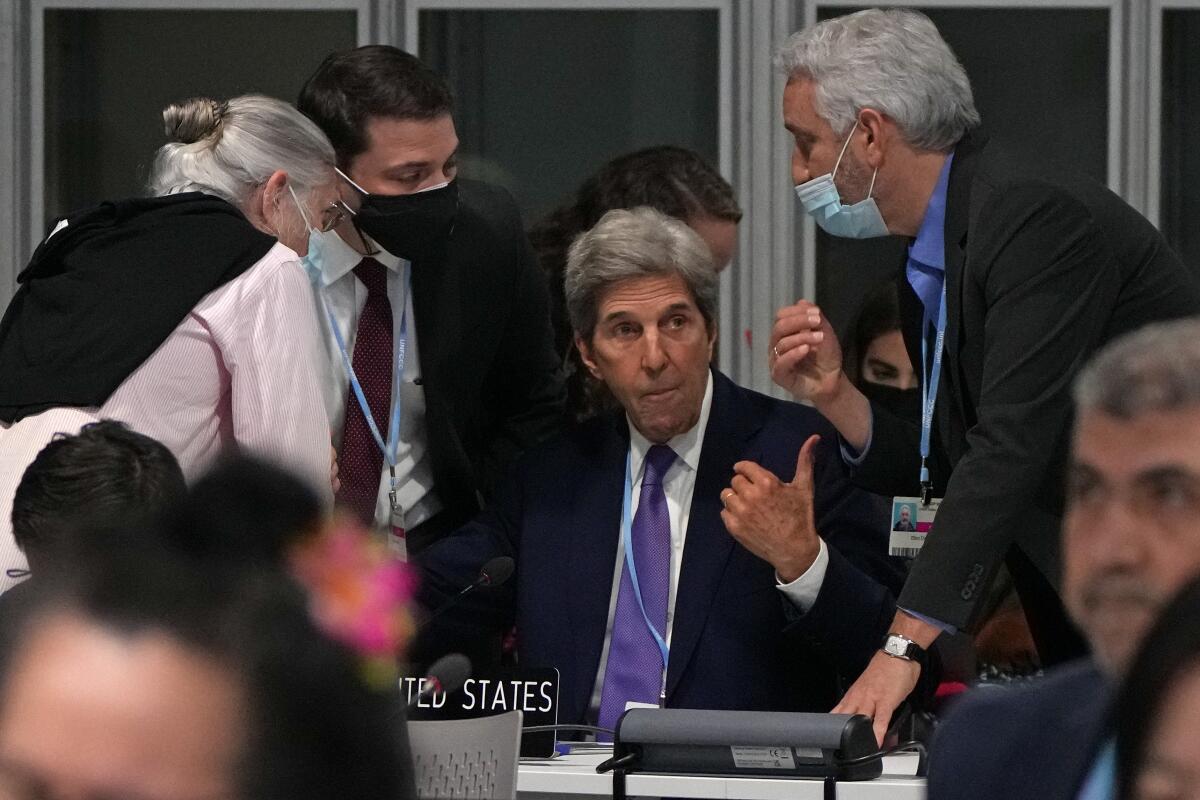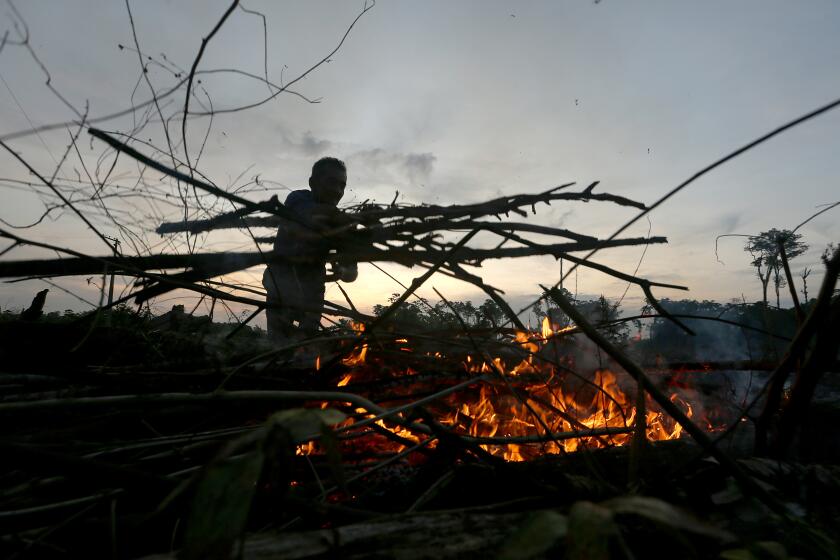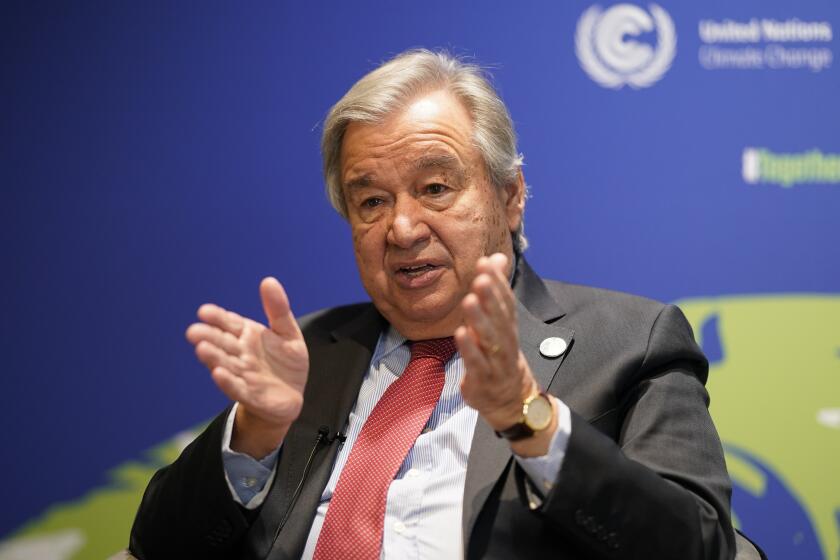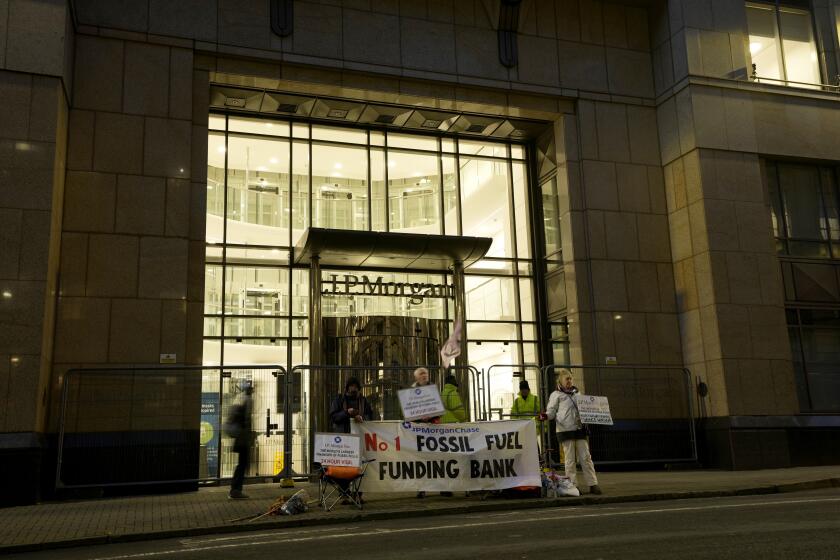Nations strike climate deal with coal compromise

- Share via
GLASGOW, Scotland — Almost 200 nations accepted a controversial climate compromise Saturday aimed at keeping a key global warming target alive, but it contained a last-minute change that watered down crucial language about coal.
Several countries, including small island states, said they were deeply disappointed by the change promoted by India to “phase down,” rather than “phase out,” coal power, the single biggest source of greenhouse gas emissions.
Nation after nation had complained earlier on the final day of two weeks of United Nations climate talks that the deal did not go far or fast enough, but they said it was better than nothing and provided incremental progress, if not success.
Negotiators from Switzerland and Mexico called the coal language change against the rules because it came so late. However, they said they had no choice but to hold their noses and go along with it.
Swiss environment minister Simonetta Sommaruga said the change would make it harder to achieve the international goal of limiting warming to 1.5 degrees Celsius, or 2.7 degrees Fahrenheit, since pre-industrial times.
United Nations summit goes into overtime before ending with an agreement in fight against climate change.
“Our fragile planet is hanging by a thread,” U.N. Secretary-General António Guterres said in a statement. “We are still knocking on the door of climate catastrophe.”
Many other nations and climate campaigners pointed at India for making demands that weakened the final agreement.
“India’s last-minute change to the language to phase down but not phase out coal is quite shocking,” said Australian climate scientist Bill Hare of the sci-ence-based Climate Action Tracker. “India has long been a blocker on climate action, but I have never seen it done so publicly.”
Others approached the deal from a more positive perspective. In addition to the revised coal language, the Glasgow Climate Pact included almost enough financial incentives to satisfy poorer nations and solved a long-standing problem to pave the way for carbon trading.
The agreement also requires that big carbon polluting nations submit new, stronger emission-cutting pledges by the end of 2022.
Heads of state, environmental activists, business leaders and journalists are in Scotland for a climate summit that comes as world leaders are running out of time to break away from fossil fuels and prevent the most catastrophic effects of global warming.
“It’s a good deal for the world,” U.S. climate envoy John F. Kerry told the Associated Press. “It’s got a few problems, but it’s all in all a very good deal.”
Before the India wording change, negotiators said the deal preserved, albeit barely, the overarching goal of limiting Earth’s warming by the end of the century to 1.5 degrees Celsius. The planet has already warmed 1.1 degrees Celsius, or 2 degrees Fahrenheit, compared to preindustrial times.
Ahead of the Glasgow talks, the United Nations had set three criteria for success, and none of them were achieved. The criteria included pledges to cut carbon dioxide emissions in half by 2030, and for rich nations to provide $100 billion in financial aid to poorer ones, half of which would go to helping the developing world adapt to the worst effects of climate change.
“We did not achieve these goals at this conference,” Guterres said Saturday night. “But we have some building blocks for progress.”
Negotiators Saturday used the word “progress” more than 20 times, but rarely used the word “success.”
Conference President Alok Sharma said the deal drives “progress on coal, cars, cash and trees” and is “something meaningful for our people and our planet.”
Antonio Guterres says the U.N.’s climate talks will ‘very probably’ not yield the carbon-cutting pledges needed to limit global warming.
Environmental activists were measured in their not-quite-glowing assessments, issued before India’s last-minute change.
“It’s meek, it’s weak and the 1.5 C goal is only just alive, but a signal has been sent that the era of coal is ending. And that matters,” said Greenpeace International Executive Director Jennifer Morgan, a veteran of the U.N. climate talks known as the Conference of the Parties.
Former Irish President Mary Robinson, speaking for a group of retired leaders called the Elders, said the pact represented “some progress, but nowhere near enough to avoid climate disaster.... People will see this as a historically shameful dereliction of duty.”
Indian Environment Minister Bhupender Yadav argued against a provision on phasing out coal, saying that developing countries were “entitled to the responsible use of fossil fuels.”
Yadav blamed “unsustainable lifestyles and wasteful consumption patterns” in rich countries for causing global warming.
After Yadav first raised the specter of changing the coal language, a frustrated European Union Vice President Frans Timmermans, the 27-nation EU’s climate envoy, begged negotiators to be united for future generations.
The world’s top carbon polluters agree to increase their cooperation and speed up action to rein in climate-damaging emissions, signaling a mutual effort on global warming.
“For heaven’s sake, don’t kill this moment,” Timmermans said. “Please embrace this text so that we bring hope to the hearts of our children and grandchildren.”
Helen Mountford, vice president of the World Resources Institute think tank, said India’s demand may not matter as much as feared because the economics of cheaper, renewable fuel is already making coal increasingly obsolete.
“Coal is dead. Coal is being phased out,” Mountford said. “It’s a shame that they watered it down.”
Kerry and several other negotiators noted that good compromises leave everyone slightly unsatisfied.
“Not everyone in public life ... gets to make choices about life and death. Not everyone gets to make choices that actually affect an entire planet. We here are privileged today to do exactly that,” he said.
Before the coal change, small island nations that are vulnerable to catastrophic effects of climate change and whose representatives in Glasgow had pushed for bolder actions said they were satisfied with the spirit of compromise, if not the outcome of the talks.
“Maldives accepts the incremental progress made in Glasgow,” said Aminath Shauna, the island nation’s minister for environment, climate change and technology. “I’d like to note that this progress is not in line with the urgency and scale with the problem at hand.”
Shauna pointed out that to stay within the warming limit that nations agreed to six years ago in Paris, the world must cut carbon dioxide emissions essentially in half in 98 months.
The developing world needs the rich world to step up, she said.“The difference between 1.5 and 2 degrees is a death sentence for us,” said Shauna, whose island nation is threatened by rising sea levels. “We didn’t cause the climate crisis. No matter what we do, it won’t reverse this.”
Next year’s talks are scheduled to take place in the Egyptian Red Sea resort of Sharm el Sheik. Dubai, United Arab Emirates, will host the meeting in 2023.
More to Read
Toward a more sustainable California
Get Boiling Point, our newsletter exploring climate change, energy and the environment, and become part of the conversation — and the solution.
You may occasionally receive promotional content from the Los Angeles Times.














